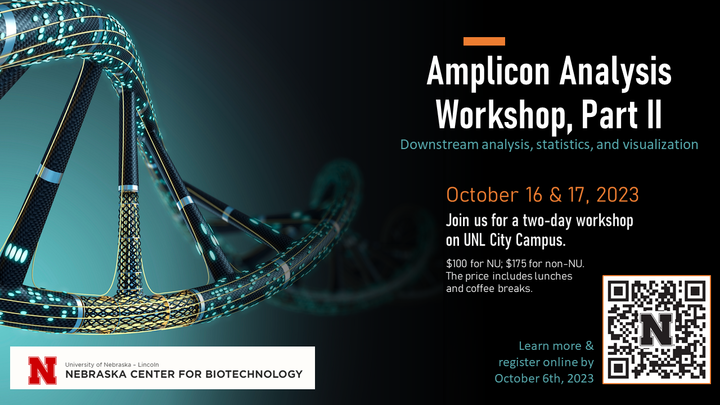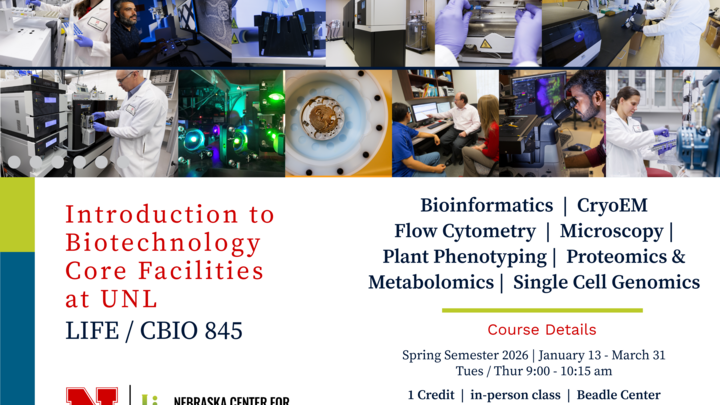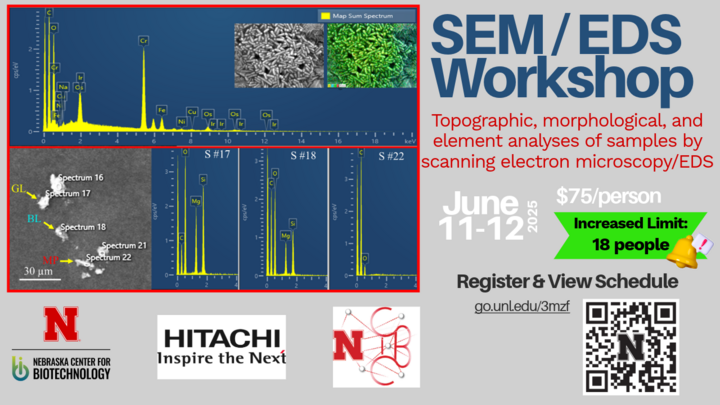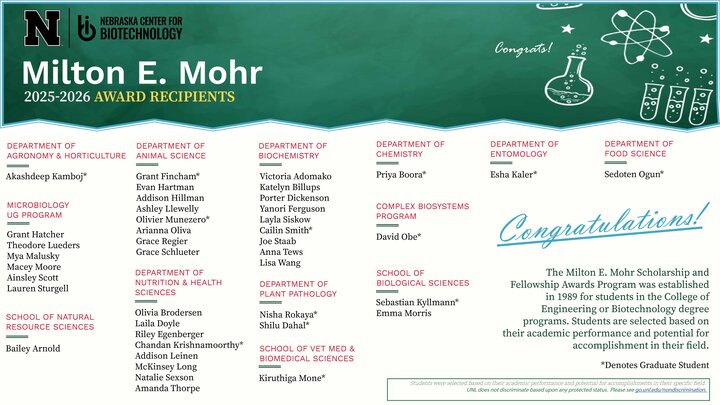Amplicon Analysis Workshop
October 16 & 17, 2023
Registration is now closed
$100.00 for Nebraska University System; $175 for non-Nebraska University System. Space is limited to 40 participants.
Read below for detailed information about the workshop and the preliminary schedule. Please also note that a requirement for this training is to have a basic understanding of the statistical programming language R (e.g. reading tab-delimited files, making plots, doing statistical tests, etc.).
Intro
The study of microbial communities, and how they interact and affect their hosts and environment, has come to the forefront in research studies in the last 10 years, especially with third-generation sequencing now available to many labs. In this workshop, the focus will be on the analysis of sequences obtained via primers to the DNA of 16S/18S rRNA genes or internal transcribed spacers (ITS1/2). This is the continuation of a workshop held in March 2023, where we went through the workflow of processing raw sequences, filtering and correcting for sequencing errors, determining amplicon sequence variants (ASVs), assigning taxonomy, and calculating and visualizing alpha and beta diversity metrics. The focus of this Part II is on the downstream statistics and visualization that follows the initial microbial community composition overview.
The majority of the training will occur on the Open On Demand (OOD) RStudio instances on the Holland Computing Center (HCC, https://hcc.unl.edu), with optional exercises on local versions of R and RStudio. As such, a requirement for this training is to have a basic understanding of the statistical programming language R (e.g. reading tab-delimited files, making plots, doing statistical tests, etc.). There are many good online tutorials for R, including one provided by Software Carpentry (http://swcarpentry.github.io/r-novice-inflammation/).
Note that the topics and schedule below are preliminary and subject to some change. A final agenda will be posted in early October 2023.
Topics covered
A (quick!) recap of raw sequence to alpha and beta diversity, the background of the type of data and its specific requirements for statistics, subsetting and grouping based on species groups and/or measured covariates, differential abundance analysis with several tools (DESeq2, LefSe, ANCOM, corncob), inferring pathways via picrust2 (and its shortcomings), differential pathway abundance, mediation analysis, canonical correlation analysis (CCA) and canonical analysis of principal (CP) coordinates.
Preliminary Schedule:
Monday 16 October 2023
08:30 – 09:30 Setup (user accounts, access) help available
09:30 – 10:30 Recap (raw sequence, pre-processing, error correction)
10:30 – 10:45 Break (coffee, tea, snacks provided)
10:45 – 12:00 Recap (tree building, taxonomic assignment, composition plots, alpha and beta diversity)
12:00 – 13:00 Lunch break (provided)
13:00 – 13:30 Background on microbiome data peculiarities with regard to downstream statistics
13:30 – 14:00 Subsetting and grouping based on taxa and/or covariates
14:00 – 14:45 Differential abundance analysis
14:45 - 15:00 Break (coffee, tea, snacks provided)
15:00 – 16:30 Continuation differential abundance analysis, intersections of tools
16:30 – 17:00 Questions and exercises
Tuesday 17 October 2023
08:30 – 09:30 Setup (local RStudio) help available
09:30 – 10:45 Picrust2: inferring pathways
10:45 – 11:00 Break (coffee, tea, snacks provided)
11:00 – 12:00 Picrust2: differential pathway analysis
12:00 – 13:00 Lunch break (provided)
13:00 – 14:30 Mediation analysis
14:30 – 14:45 Break (coffee, tea, snacks provided)
14:45 – 15:30 Continuation mediation analysis
15:30 – 16:30 CCA and CAP analysis
16:30 – 17:00 Exercises and questions
Please contact Jean-Jack M. Riethoven (jeanjack@unl.edu) or Kaitlin Bachle (kbachle2@unl.edu) if you have questions or need to cancel your registration.




